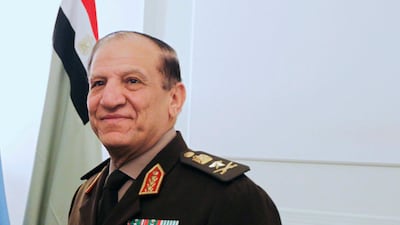Egypt's parliament approved a law on Monday giving senior military officers immunity from prosecution tied to unrest that followed the ouster of Islamist president Mohammed Morsi, an MP said.
The bill was endorsed by a majority of parliamentarians with only eight opposition MPs in the 596-seat assembly voting against it, said Haitham Al Hariri who was among those who opposed it.
It has yet to be ratified by President Abdel Fattah El Sisi to become law.
The parliament's website said a "law concerning the status of senior armed forces commanders" had been approved, but it gave no further details.
According to Mr Hariri, the law would grant immunity to officers for any action they might have carried out from July 2013 to June 2014, unless the Supreme Armed Forces Council opposes it.
On July 3, 2013, the army, then headed by Mr Sisi, overthrew Morsi after massive protests against his divisive rule.
__________
Read more
Egypt parliament approves bill to monitor social media
Egypt set to offer new path to citizenship
__________
Thousands of supporters of Morsi, Egypt's first freely elected president, demonstrated for weeks in two Cairo squares following his ouster.
On August 14 security forces dispersed two pro-Morsi camps in the capital, killing about 700 people in clashes within hours.
Hundreds more were killed in street clashes with police over several months after the August 14 carnage.
Global rights groups Amnesty International and Human Rights Watch say at least 40,000 people were arrested within the first year of Morsi's removal.
Hundreds more have been sentenced to death or lengthy jail terms after speedy mass trials, including Morsi and several leaders of his outlawed Muslim Brotherhood.
Mr Sisi succeeded Morsi and was elected president with 96.9 per cent of the vote in June 2014. He won a second four-year term in March with 97 permcent of the vote.
Mr Hariri criticised the law and the powers it could give Mr Sisi, saying decisions concerning the military should be taken only by the Supreme Council of the Armed Forces.
"Why should they need immunity if they did not commit any wrongdoing," he said of the officers, who have not been named.
"The Supreme Council of the Armed Forces should be the one to take decisions concerning the military. It is not logical for one person to take these decisions," he said.

